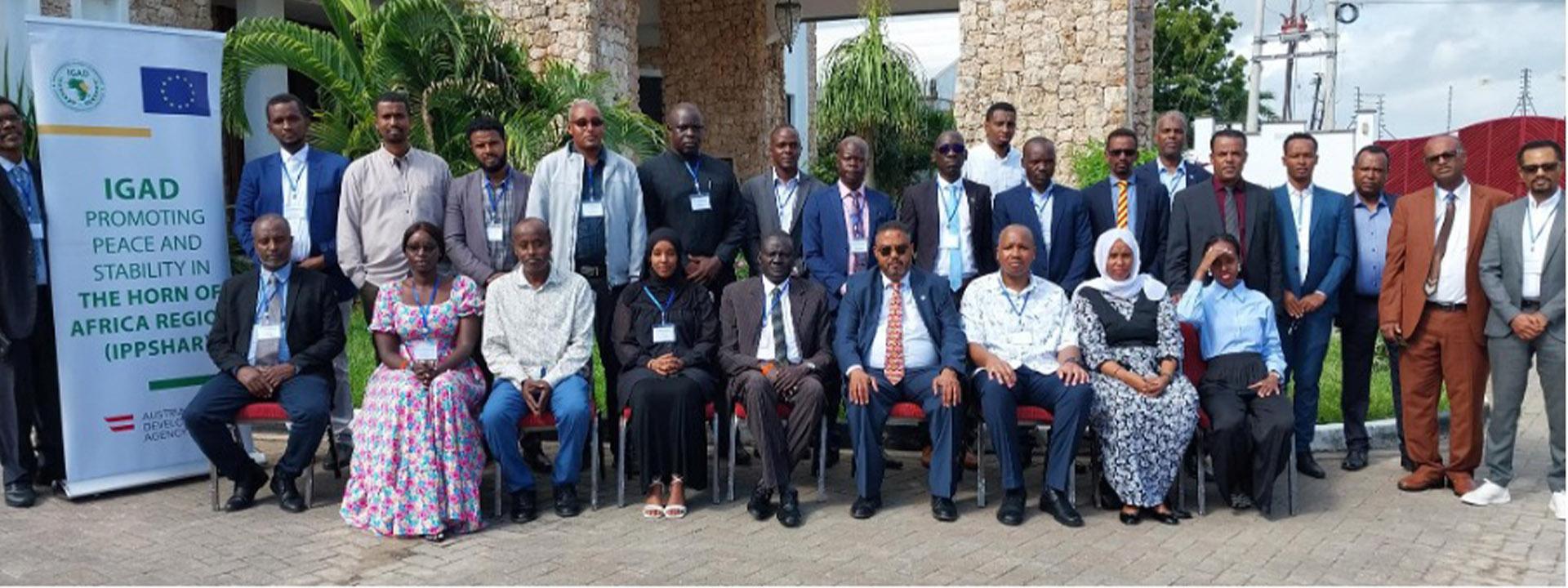July 8, 2023 (Mombasa, Kenya): The IGAD Security Sector Program (IGAD SSP) has successfully concluded a Regional Conference on the Existing Cybersecurity Frameworks of all IGAD Member States. Cybersecurity can be described as a collection of tools, policies, guidelines, procedures, risk management approaches, actions, training, best practices, assurance, and technologies that can be used to protect the availability, integrity, and confidentiality of assets in the connected infrastructures belonging to the government, private organizations, and citizens. It focuses on protecting information, data, and information technologies from threats that come from mainly the Internet within cyberspace through unauthorized access, unauthorized changes, and damages.
The overall objective of the conference is to examine the existing cybersecurity frameworks, enhance the capacity and capability of the Member States in their effort to prevent and counter the threats committed in cyberspace and contribute to mitigating the overall transnational security threats at national and regional levels.
On behalf of H.E. Workneh Gebeyehu (PhD), Executive Secretary of IGAD; Commander Abebe Muluneh Beyene, the Director of IGAD SSP, Head of IGAD Mission to Ethiopia, has delivered the Key Note speech and expressed his sincerest gratitude to the Government of Kenya for hosting this conference; also, he thanked the European Union and ADA for their generous support towards this event.
Commander Abebe has reaffirmed the lead role of IGAD to bring sustainable peace and security in the region by enhancing and enabling member states’ security sector capacities to address common transitional security threats (TSTs). Furtheremore, the Director has highlighted that the IGAD region is currently facing a variety of serious and complex emerging, evolving, and existing transnational security threats such as terrorism, organized crime, trafficking in person and smuggling of migrants, drug trafficking, arms trafficking, cyber-crime, to name but a few. He has particularly described Cyber security as the complete universe of tools, practices, and rules that protect data assets from malicious actors. and therefore stressed the need to put standard Cyber security frameworks in place, as it enables Member States reduce the risk of data breaches and cyberattacks.
A total of 30 senior practitioners (24 Male and 6 Female) from relevant state agencies who deal directly with cybersecurity frameworks have attended the conference. The conference has therefore outlined and thereby thoroughly discussed on such thematic areas like; Cybercrime and threats on the cyberspace, Internet and digital national sovereignty; Institutional set-up of the frameworks; Legal instruments at national, regional, and international levels; Capabilities and adaptability; Cooperation and coordination among relevant actors at national and regional levels,.
At his concluded remark, Commander Abebe Muluneh in his capacity and on behalf of H.E. Workneh Gebeyehu (PhD) – the Executive Secretary of IGAD stressed IGAD Member states has to develop the Cyber Security Frameworks from any cber-attacks to prevent and recover by applying the five best practices such as (1) identify: to manage the security risks to its assets, data capabilities, and systems to identify potential weak spots, (2) protect: create and deploy appropriate safeguard to lessen or limit the effects if potential cyber security breaches and events, (3) detect: organization should put in motion the necessary procedures to identify cyber security incidents as soon as possible, (4) respond: companies must be capable of developing appropriate response plans to contain the impacts of any cyber security events, and (5) recover: Companies must create and implement effective procedures that restore any capabilities and services damaged by cyber security events.
This regional training is organized with financial support from the European Union through European Union Trust Fund (EUTF), which is being implemented by IGAD SSP and the Austrian Development Agency (ADA).

